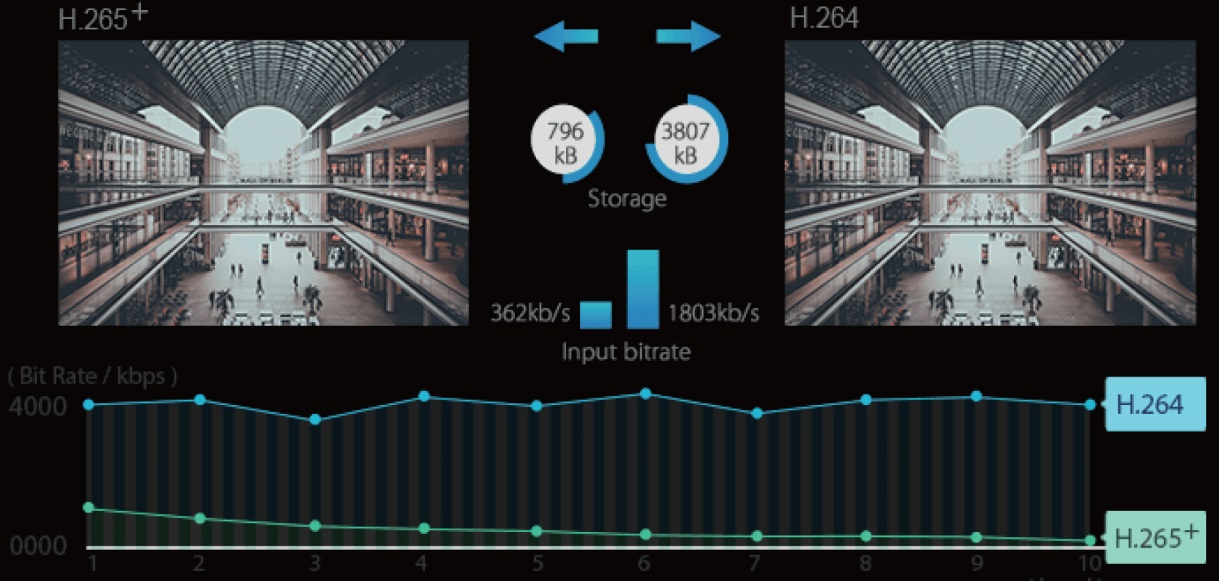#include <string.h>
#include "absl/types/optional.h"
#include "absl/types/variant.h"
#include "common_video/h264/h264_common.h"
#include "common_video/h265/h265_common.h"
#include "common_video/h265/h265_pps_parser.h"
#include "common_video/h265/h265_sps_parser.h"
#include "common_video/h265/h265_vps_parser.h"
#include "modules/include/module_common_types.h"
#include "modules/rtp_rtcp/source/byte_io.h"
#include "modules/rtp_rtcp/source/rtp_format_h265.h"
#include "modules/rtp_rtcp/source/rtp_packet_to_send.h"
#include "rtc_base/logging.h"
using namespace rtc;
namespace webrtc {
namespace {
enum NaluType {
kTrailN = 0,
kTrailR = 1,
kTsaN = 2,
kTsaR = 3,
kStsaN = 4,
kStsaR = 5,
kRadlN = 6,
kRadlR = 7,
kBlaWLp = 16,
kBlaWRadl = 17,
kBlaNLp = 18,
kIdrWRadl = 19,
kIdrNLp = 20,
kCra = 21,
kVps = 32,
kHevcSps = 33,
kHevcPps = 34,
kHevcAud = 35,
kPrefixSei = 39,
kSuffixSei = 40,
kHevcAp = 48,
kHevcFu = 49
};
static const size_t kHevcNalHeaderSize = 2;
static const size_t kHevcFuHeaderSize = 1;
static const size_t kHevcLengthFieldSize = 2;
enum HevcNalHdrMasks {
kHevcFBit = 0x80,
kHevcTypeMask = 0x7E,
kHevcLayerIDHMask = 0x1,
kHevcLayerIDLMask = 0xF8,
kHevcTIDMask = 0x7,
kHevcTypeMaskN = 0x81,
kHevcTypeMaskInFuHeader = 0x3F
};
enum HevcFuDefs { kHevcSBit = 0x80, kHevcEBit = 0x40, kHevcFuTypeBit = 0x3F };
}
RtpPacketizerH265::RtpPacketizerH265(
rtc::ArrayView<const uint8_t> payload,
PayloadSizeLimits limits,
H265PacketizationMode packetization_mode)
: limits_(limits),
num_packets_left_(0) {
RTC_CHECK(packetization_mode == H265PacketizationMode::NonInterleaved ||
packetization_mode == H265PacketizationMode::SingleNalUnit);
for (const auto& nalu :
H264::FindNaluIndices(payload.data(), payload.size())) {
input_fragments_.push_back(
payload.subview(nalu.payload_start_offset, nalu.payload_size));
}
if (!GeneratePackets(packetization_mode)) {
num_packets_left_ = 0;
while (!packets_.empty()) {
packets_.pop();
}
}
}
RtpPacketizerH265::~RtpPacketizerH265() {}
size_t RtpPacketizerH265::NumPackets() const {
return num_packets_left_;
}
bool RtpPacketizerH265::GeneratePackets(
H265PacketizationMode packetization_mode) {
for (size_t i = 0; i < input_fragments_.size();) {
int fragment_len = input_fragments_[i].size();
int single_packet_capacity = limits_.max_payload_len;
if (input_fragments_.size() == 1)
single_packet_capacity -= limits_.single_packet_reduction_len;
else if (i == 0)
single_packet_capacity -= limits_.first_packet_reduction_len;
else if (i + 1 == input_fragments_.size()) {
single_packet_capacity -= limits_.last_packet_reduction_len;
}
if (fragment_len > single_packet_capacity) {
PacketizeFu(i);
++i;
} else {
PacketizeSingleNalu(i);
++i;
}
}
return true;
}
bool RtpPacketizerH265::PacketizeFu(size_t fragment_index) {
rtc::ArrayView<const uint8_t> fragment = input_fragments_[fragment_index];
PayloadSizeLimits limits = limits_;
limits.max_payload_len -= kHevcFuHeaderSize + kHevcNalHeaderSize;
if (input_fragments_.size() != 1) {
if (fragment_index == input_fragments_.size() - 1) {
limits.single_packet_reduction_len = limits_.last_packet_reduction_len;
} else if (fragment_index == 0) {
limits.single_packet_reduction_len = limits_.first_packet_reduction_len;
} else {
limits.single_packet_reduction_len = 0;
}
}
if (fragment_index != 0)
limits.first_packet_reduction_len = 0;
if (fragment_index != input_fragments_.size() - 1)
limits.last_packet_reduction_len = 0;
size_t payload_left = fragment.size() - kHevcNalHeaderSize;
int offset = kHevcNalHeaderSize;
std::vector<int> payload_sizes = SplitAboutEqually(payload_left, limits);
if (payload_sizes.empty())
return false;
for (size_t i = 0; i < payload_sizes.size(); ++i) {
int packet_length = payload_sizes[i];
RTC_CHECK_GT(packet_length, 0);
uint16_t header = (fragment[0] << 8) | fragment[1];
packets_.push(PacketUnit(fragment.subview(offset, packet_length),
i == 0,
i == payload_sizes.size() - 1,
false, header));
offset += packet_length;
payload_left -= packet_length;
}
num_packets_left_ += payload_sizes.size();
RTC_CHECK_EQ(0, payload_left);
return true;
}
bool RtpPacketizerH265::PacketizeSingleNalu(size_t fragment_index) {
size_t payload_size_left = limits_.max_payload_len;
if (input_fragments_.size() == 1)
payload_size_left -= limits_.single_packet_reduction_len;
else if (fragment_index == 0)
payload_size_left -= limits_.first_packet_reduction_len;
else if (fragment_index + 1 == input_fragments_.size())
payload_size_left -= limits_.last_packet_reduction_len;
rtc::ArrayView<const uint8_t> fragment = input_fragments_[fragment_index];
if (payload_size_left < fragment.size()) {
RTC_LOG(LS_ERROR) << "Failed to fit a fragment to packet in SingleNalu "
"packetization mode. Payload size left "
<< payload_size_left << ", fragment length "
<< fragment.size() << ", packet capacity "
<< limits_.max_payload_len;
return false;
}
RTC_CHECK_GT(fragment.size(), 0u);
packets_.push(PacketUnit(fragment, true , true ,
false , fragment[0]));
++num_packets_left_;
return true;
}
int RtpPacketizerH265::PacketizeAp(size_t fragment_index) {
size_t payload_size_left = limits_.max_payload_len;
if (input_fragments_.size() == 1)
payload_size_left -= limits_.single_packet_reduction_len;
else if (fragment_index == 0)
payload_size_left -= limits_.first_packet_reduction_len;
int aggregated_fragments = 0;
size_t fragment_headers_length = 0;
rtc::ArrayView<const uint8_t> fragment = input_fragments_[fragment_index];
RTC_CHECK_GE(payload_size_left, fragment.size());
++num_packets_left_;
auto payload_size_needed = [&] {
size_t fragment_size = fragment.size() + fragment_headers_length;
if (input_fragments_.size() == 1) {
return fragment_size;
}
if (fragment_index == input_fragments_.size() - 1) {
return fragment_size + limits_.last_packet_reduction_len;
}
return fragment_size;
};
while (payload_size_left >= payload_size_needed()) {
RTC_CHECK_GT(fragment.size(), 0);
packets_.push(PacketUnit(fragment, aggregated_fragments == 0, false, true,
fragment[0]));
payload_size_left -= fragment.size();
payload_size_left -= fragment_headers_length;
fragment_headers_length = kHevcLengthFieldSize;
if (aggregated_fragments == 0)
fragment_headers_length += kHevcNalHeaderSize + kHevcLengthFieldSize;
++aggregated_fragments;
++fragment_index;
if (fragment_index == input_fragments_.size())
break;
fragment = input_fragments_[fragment_index];
}
RTC_CHECK_GT(aggregated_fragments, 0);
packets_.back().last_fragment = true;
return fragment_index;
}
bool RtpPacketizerH265::NextPacket(RtpPacketToSend* rtp_packet) {
RTC_DCHECK(rtp_packet);
if (packets_.empty()) {
return false;
}
PacketUnit packet = packets_.front();
if (packet.first_fragment && packet.last_fragment) {
size_t bytes_to_send = packet.source_fragment.size();
uint8_t* buffer = rtp_packet->AllocatePayload(bytes_to_send);
memcpy(buffer, packet.source_fragment.data(), bytes_to_send);
packets_.pop();
input_fragments_.pop_front();
} else if (packet.aggregated) {
bool is_last_packet = num_packets_left_ == 1;
NextAggregatePacket(rtp_packet, is_last_packet);
} else {
NextFragmentPacket(rtp_packet);
}
rtp_packet->SetMarker(packets_.empty());
--num_packets_left_;
return true;
}
void RtpPacketizerH265::NextAggregatePacket(RtpPacketToSend* rtp_packet,
bool last) {
size_t payload_capacity = rtp_packet->FreeCapacity();
RTC_CHECK_GE(payload_capacity, kHevcNalHeaderSize);
uint8_t* buffer = rtp_packet->AllocatePayload(payload_capacity);
RTC_CHECK(buffer);
PacketUnit* packet = &packets_.front();
RTC_CHECK(packet->first_fragment);
uint8_t payload_hdr_h = packet->header >> 8;
uint8_t payload_hdr_l = packet->header & 0xFF;
uint8_t layer_id_h = payload_hdr_h & kHevcLayerIDHMask;
payload_hdr_h =
(payload_hdr_h & kHevcTypeMaskN) | (kHevcAp << 1) | layer_id_h;
buffer[0] = payload_hdr_h;
buffer[1] = payload_hdr_l;
int index = kHevcNalHeaderSize;
bool is_last_fragment = packet->last_fragment;
while (packet->aggregated) {
rtc::ArrayView<const uint8_t> fragment = packet->source_fragment;
ByteWriter<uint16_t>::WriteBigEndian(&buffer[index], fragment.size());
index += kHevcLengthFieldSize;
memcpy(&buffer[index], fragment.data(), fragment.size());
index += fragment.size();
packets_.pop();
input_fragments_.pop_front();
if (is_last_fragment)
break;
packet = &packets_.front();
is_last_fragment = packet->last_fragment;
}
RTC_CHECK(is_last_fragment);
rtp_packet->SetPayloadSize(index);
}
void RtpPacketizerH265::NextFragmentPacket(RtpPacketToSend* rtp_packet) {
PacketUnit* packet = &packets_.front();
uint8_t payload_hdr_h =
packet->header >> 8;
uint8_t payload_hdr_l = packet->header & 0xFF;
uint8_t layer_id_h = payload_hdr_h & kHevcLayerIDHMask;
uint8_t fu_header = 0;
fu_header |= (packet->first_fragment ? kHevcSBit : 0);
fu_header |= (packet->last_fragment ? kHevcEBit : 0);
uint8_t type = (payload_hdr_h & kHevcTypeMask) >> 1;
fu_header |= type;
payload_hdr_h =
(payload_hdr_h & kHevcTypeMaskN) | (kHevcFu << 1) | layer_id_h;
rtc::ArrayView<const uint8_t> fragment = packet->source_fragment;
uint8_t* buffer = rtp_packet->AllocatePayload(
kHevcFuHeaderSize + kHevcNalHeaderSize + fragment.size());
RTC_CHECK(buffer);
buffer[0] = payload_hdr_h;
buffer[1] = payload_hdr_l;
buffer[2] = fu_header;
if (packet->last_fragment) {
memcpy(buffer + kHevcFuHeaderSize + kHevcNalHeaderSize, fragment.data(),
fragment.size());
} else {
memcpy(buffer + kHevcFuHeaderSize + kHevcNalHeaderSize, fragment.data(),
fragment.size());
}
packets_.pop();
}
}
|


